
Elementary Grades Program
The Mountain Sage educational program for grades 1st-5th is grounded in Waldorf education and sustainability, and draws inspiration from relevant modern day thinking aligned with our core values. Teachers are focused on whole-child education, academic readiness and excellence, and building community.
Grade 1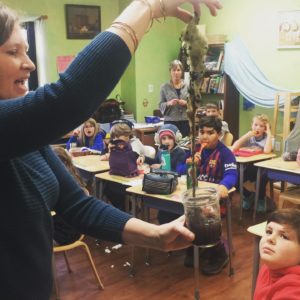
First Grade is the beginning of the child’s formal relationship to learning. It is a time of joy and adventure. Imbued with creativity, activity, imagination and rhythm, the first grade child develops a positive relationship with schooling and learning, paving the way for a future of excellence and achievement in all aspects of their life. (Paraphrased from Donna Simmons, Waldorf educator.)
Math: Qualities of numbers; introduction to the four operations of arithmetic; simple geometric forms; whole number processes; counting rhythms; times tables 2 through 6; number bonds and inverse operations using manipulatives; roman numerals
Literacy: Pictorial and phonetic introduction to the alphabet both upper and lower case; learning to write and read; grammar; poetry recitation; Fairy and folk tales from around the world; beginning spelling, punctuation, and phonics
Science: Nature stories; nature walks; observations; gardening; local environment; seasons; weather, animals
Music: Tone matching, singing and movement games; interval flutes (developing breath control); pentatonic music/mood of the fifth; pentatonic body scale; songs based on seasonal themes
Art: Form drawing; wet-on-wet watercolor painting (emphasizing an experience of working with color rather than creating formed pictures); beeswax modeling; crayon illustrations
World Language: Spanish through songs, rhythms, poems and games
Handwork: Simple sewing, cutting skills, finger knitting and knitting with two needles (promotes eye-hand coordination, fine motor, and arithmetic skills, sequencing, patience, perseverance and self-esteem); seasonal crafts
History & Social Studies: Fairy & folk tales from around the world, rhymes, poems, songs
Geography: Spatial orientation, body geography
Physical Education: Circle games, cooperative outdoor games, Tag games, chasing and fleeing games, imagination games
Grade 2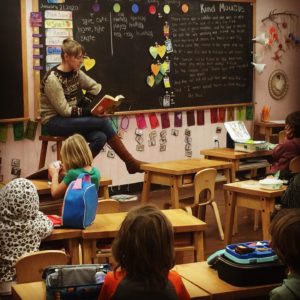
The Second Grader begins to experience the polarities in life, and The second-grade curriculum caters to the internal qualities that are alive in the children through presenting these polarities as characterized in fables and stories of noble individuals. The stories of saints, heroes, and fables guide children in their moral development. Literature from every culture provides fables which show our animal characteristics pitted one against another. The fables point out the foibles becoming more apparent in the seven and eight-year-old. As a contrast, tales of saintly, noble, and heroic individuals reassure the second graders and give them an upright example to emulate.
Math: Continue with four operations of arithmetic; story problems; number patterns; times tables 7 through 12, division, written calculations, double digit calculations with regrouping
Literature & Grammar: Reading and writing; phonics; elements of grammar (naming words, doing words, and describing words); Animal fables, wisdom tales from around the world, great people
Science: Garden and nature studies; school and local environment, seasons; animals
Music: Singing and movement games, songs based on seasonal themes/folk songs/tall tales; pentatonic flutes (developing finger coordination, concentration, breath control); contrasts in music; pre-reading rhythms and melody
Art: Continue form drawing and modeling lines of symmetry; watercolor painting; beeswax scene modeling, crayon drawings
World Language: Spanish vocabulary, games and songs, counting, animals, colors
Handwork: Knitting patterns of knit and purl (pattern recognition and perpetuation, concentration, fine motor skill development)
History & Social Studies: Legends and stories of heroic people and animal fables
Geography: Natural studies
Physical Education: Rhythmic games, line games, Tag games, chasing and fleeing games, imagination games, outdoor games
Grade 3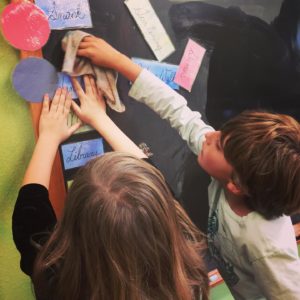
In third grade, children experience a new sense of self. Students begin to question who they are relative to others and to the world. Waldorf education recognizes this stage of self-discovery as the nine-year change. Children at this stage begin to recognize what it means to step into the real world, and to begin to stand on their own. In response to this growing awareness and sense of self, the curriculum connects third graders to meaningful, practical work, such as construction, farming, and gardening. Developing these skills helps students build confidence and stamina. The student’s are presented with rich stories from early peoples which meet and reflect the third grader’s inner experience. These stories present strong role models who show courage and determination, and they teach foundational language arts which promote writing and independent reading.
Math: Memorization of math facts with all four processes including multiplication; weight; measure; length; volume; money; time; two- to three-digit multiplication; multiplication and division word problems
Literature & Grammar: Elements of grammar; cursive handwriting; punctuation; compositions; stories from ancient history
Science: Gardening; soil; nature studies; animal husbandry; conservation; cooking; house building; farming
Music: Singing and movement games, singing in rounds, songs based on seasonal themes; soprano recorder; introduction to musical notation and note reading
Art: Continue form drawing; human gestures in illustrations; painting; beeswax scenes from history; pencil drawing, modeling with clay
World Language: Spanish songs, plays, poetry, conversations, and vocabulary
Handwork: Crochet (pattern and placement recognition, finger dexterity); hand sewing
History & Social Studies: Study of practical life (house building, clothing, and cooking) around the world
Geography: History of Farming and House building
Physical Education: Traditional Games, cooperative games, team work games, fundamental skills of throwing, catching, and kicking
Grade 4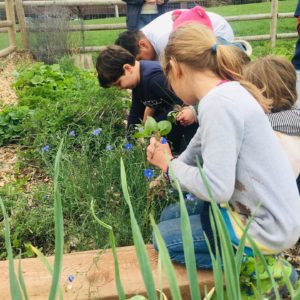
The fourth grader, having left behind some of the carefreeness of childhood and still experiencing some of the tumultuous emotions of the nine-year-change, now wants to know the world intellectually and profits from the experience of traversing conflict and relying on their own resourcefulness to reach resolution. In form drawing, seemingly impossible braiding is mastered. In math, fractions are puzzled over and then understood in new ways. The fourth grader looks for heroes (as well as tricksters with human shortcomings) and finds them in Norse mythology – and they come to know their own history and sense of place in the world as they study local geography and history (including a study of the Native American people who first inhabited Colorado.) The fourth grader also enjoys a scientific study of animals, with a focus on the relationship between human and animal attributes and a culminating independent research project about one specific animal.
Math: multi-digit multiplication; long division; fractions; averages; factoring
Literature & Grammar: Elements of grammar; continuing cursive; punctuation; book reports; creative writing; report writing and research; composition; Norse and/or Finnish mythology, Native American Legends
Science: Zoology, animals in their environment; continuation of gardening and nature studies
Music: Singing and movement games, songs based on seasonal themes/Norse songs/Colorado state songs, part-singing; soprano recorder; note values; musical notation and note reading
Art: Advanced (woven) form drawing; painting; clay modeling, chalk pastels
World Language: Spanish songs, plays, poetry, conversations, cultural activities, vocabulary, and beginning writing
Handwork: Cross-stitch; embroidery; knotting; braiding (creating patterns from front to back)
History & Social Studies: Local and Colorado history
Geography: Local and Colorado geography; map making
Physical Education: Folk dancing; Relay Races, traditional games, teamwork games, cooperative games, fundamental skills of throwing, catching, and kicking
Technology: keyboarding
Grade 5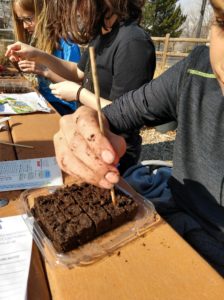
The fifth-grade year is often spoken of as “the golden age of childhood.” The child is more balanced, graceful, and poised than they have been before and that they will be again for several years. Intellectually, fifth graders have a greatly increased capacity for examination, thought and reflection. The fifth-grade year encompasses a wider scope of study than any previous grade. The children are growing in their intellectual capacities, and the curriculum meets this expansion with the study of: ancient cultures, Botany, North America, and more complex math topics. Their work reflects this new depth to their understanding and questioning.
Math: Decimals; fractions; metric system; geometry as it developed in ancient cultures
Literature & Grammar: Elements of grammar; sentence structure; descriptive writing; continuing grammar and compositions; report writing and research; writing about curriculum topics
Science: Botany; Inductive Method; continuation of garden and nature studies
Music: Singing and movement games, songs based on seasonal/curriculum themes, part-singing/parallel harmonies; soprano recorder; musical notation and note reading
Art: Freehand geometric drawing; painting; clay modeling; varied landscapes; pencil drawing
World Language: Spanish simple conversations, poetry, cultural activities, vocabulary, continued writing, and exploration of Central America
Handwork: Knitting in rounds; knitting socks, hats, or mittens (develop and follow written instructions)
History & Social Studies: Mythology and life in ancient civilizations: Persia, Mesopotamia, India, Egypt, and through Greece up to the life of Alexander the Great
Geography: North American geography as related to vegetation, agriculture, culture and economics; Native American stories and culture
Physical Education: Greek Olympic games (the pentathlon), competitive games. Students will be introduced, on a smaller scale, sports such as football, soccer, and volleyball.
Technology: keyboarding